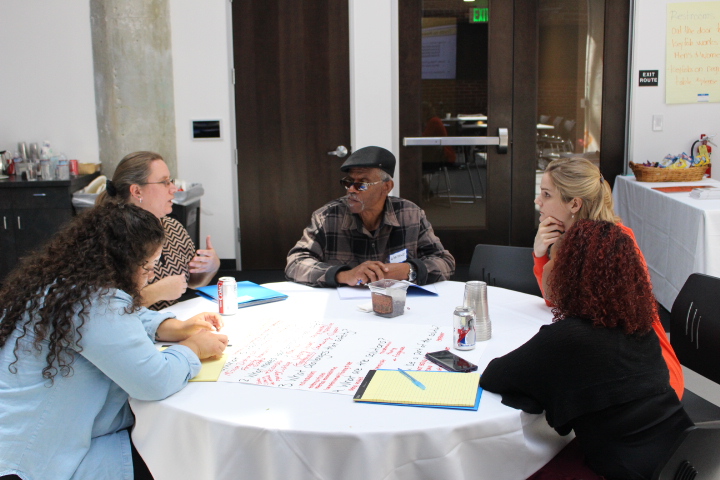In July, a group of advocates from across California met in Sacramento, just blocks from the State Capitol, for the Next Generation Fellowship, a six-day leadership development and policy advocacy training for emerging community leaders. Amid differences in age, race/ethnicity and gender, each of the 15 fellows share a powerful connection: They have been directly impacted by the justice system.

Renee Menart
The Next Generation Fellowship recognizes that the true costs of incarceration are felt by those who have lived it. For some, this experience lies in their own incarceration; for others, the impacts of incarceration are woven into their family or community. All too often, individuals have faced the backlash of the justice system through all these layers.
Thus, the key solutions for effective justice reforms are rooted in the communities most impacted. Leaders of these communities are equipped to build change from the ground up through cultural healing and policy training, as well as a developed supportive network. The Next Generation Fellowship, which is a collaboration between two California-based advocacy organizations, Motivating Individual Leadership for Public Advancement (MILPA) and the Center on Juvenile and Criminal Justice, supports fellows by fostering effective storytelling, strategic advocacy and civic participation to bridge the gap between their communities and the capitol.
As justice agencies and advocates work to make their decision-making processes more inclusive, it is vital that justice-involved youth and adults be engaged in a meaningful way. Neither showcasing nor tokenism will cut it. These mistaken approaches can harm the individuals whose experiential knowledge should be uplifted in the decision-making process. What’s more, they draw the conversation away from potential solutions for community safety and keep decision-makers chasing their tails. Instead, justice-impacted leaders should be met with support and a genuine intent to broaden the conversation in ways that are representative of our nation’s diverse communities.
At the center of meaningful social change is not the individual leader, but the communities within which they are rooted. True changemakers in the community as well as policy advocates, know that collective power requires a strong, healthy, supportive network of allies.
Juan Gomez, director of programs and innovation at MILPA, an organization that incubates leadership and builds community power through cultural healing, views this as, "The root and fruit of how we should roll, with respect to the elders, acknowledgment of the yellers and supportive of the young stars. It is important to build up and reclaim our concept of the healthy village. At the end of the day, it takes solidarity, community and a lot of unity.”
Community advocates credible leaders
Prioritizing the advancement of justice-involved community advocates is particularly promising because their leadership development has the potential to have a positive ripple effect. Leaders who are authentic, credible and culturally rooted within a community are uniquely positioned to mobilize others locally for change on the state level.
Currently, people who have experienced incarceration face barriers to civic engagement — particularly when it comes to voting rights. In most states, they are barred from voting during and following their incarceration, with 12 states keeping some formerly incarcerated people away from the polls for the rest of their lives. But the impacts don't end there. Traci Burch, a professor and researcher at Northwestern University, found lower participation in voting to be true not only for the individuals who were formerly incarcerated themselves but for their broader communities.
These results are harrowing as they highlight how the criminal justice disempowers communities, largely communities of color, within policymaking.
A variety of advocacy approaches are necessary to address this issue, including civic engagement strategies that uplift community leaders locally and state policymaking. In addition to extensive leadership trainings, one- to two-day advocacy events can promote broader political engagement among members of communities impacted by the policies in play.
For example, the annual Youth Power Summit advocacy day provided hundreds of youth from across California an opportunity to engage in the policymaking process firsthand. Youth leaders met with their representatives and rallied around legislation that is important to their communities, including Senate Bill 439, which would set a minimum age of 12 for prosecution in juvenile court.
Amid a growing recognition that lived experience is a powerful form of expertise desperately needed on our path toward justice reform, the Next Generation Fellowship can serve as a model for programs nationwide seeking to be a part of this paradigm shift. By supporting formerly incarcerated and justice-involved leaders in leveraging their lived experiences to shape the policies that impact our nation’s diverse communities, we can build solutions that recognize the human impact of justice policies. Transformation for our justice system requires a renewed vision of community health, safety and wellness and a push to narrow the gap between policy decision-making and those who experience its true costs.
Renee Menart is a communications and policy analyst with the Center on Juvenile and Criminal Justice in San Francisco.
